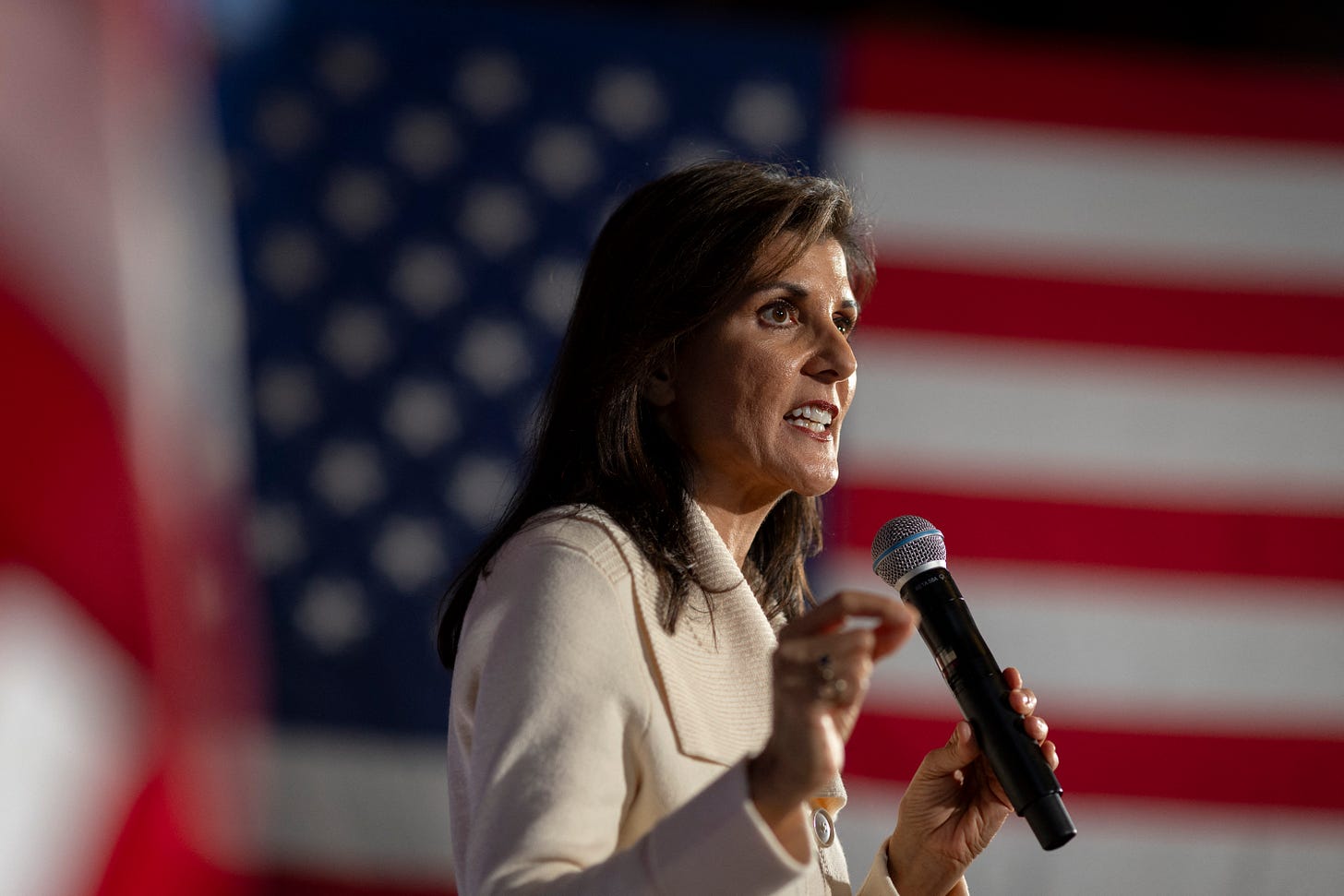Trump’s Birthright Citizenship Canard
Trump’s attack on Haley isn’t just about the presidency—it’s about the citizenship of millions of Americans.

FACING QUESTIONS ABOUT WHETHER the 14th Amendment disqualifies him from running for president, Donald Trump suggested earlier this week that the one who should be worried about disqualification is Nikki Haley. Dredging up one of his favorite canards, Trump promoted the theory that Haley is not a “natural born citizen” and, thus, is ineligible under the Constitution from becoming either president or vice president. For years, Trump falsely accused Barack Obama of failing the natural born citizen test as well, alleging he was born in Kenya. But Obama’s birth certificate, released in 2011, confirmed that he was born in Hawaii. Trump’s accusation this time isn’t about where Haley was born (in Bamberg, South Carolina) but about whether children born to non-citizen immigrants can be considered natural born citizens. The issue has far-reaching implications and affects far more than who is eligible to be president.
The 14th Amendment states clearly: “All persons born or naturalized in the United States, and subject to the jurisdiction thereof, are citizens of the United States and of the State wherein they reside.” But fringe interpretations have emerged over the last two decades, largely in response to illegal immigration. A handful of legal scholars on the right—including John Eastman, one of the architects of Trump’s coup, whose interpretations of the Constitution have landed him in serious legal jeopardy—assert that birthright citizenship excludes children born in the United States to non-citizens. Initially, these skeptics focused on the exclusion of American-born children of illegal immigrants, but some have now broadened their claims to include children born to all non-naturalized immigrants, which is why Trump came to focus on Haley. Her parents were born in India and emigrated first to Canada and then the United States, but did not naturalize until after Haley’s 1972 birth—her father in 1978 and her mother in 2003. Though Trump made no mention of Vivek Ramaswamy, he, too, would be ineligible under this radical misinterpretation of the 14th Amendment since neither of his parents was a citizen at the time of his birth.
I’ve written at length about birthright citizenship elsewhere, including in a long debate with Eastman in the Claremont Review of Books. Opponents of birthright citizenship for the children of immigrants stake their claims on the phrase “subject to the jurisdiction thereof” as it applies to those born in the United States. In their reading, immigrants are not subject to U.S. jurisdiction—which begs the question how we can enforce not only our immigration laws to remove them but other criminal and civil laws as well. But the Senate debate on this language when it was considering the 14 Amendment made clear that the concern was not to exclude the children of immigrants—who made up a sizable portion of the population in 1866—but, rather, Native Americans. Disgracefully, Native Americans were excluded from full citizenship rights under the fiction that they were members of sovereign nations existing within the territory of the United States and did not gain birthright citizenship until 1924 with the passage of the Indian Citizenship Act. The other groups excluded by the phrase “subject to the jurisdiction” were children born to diplomats (a universally recognized exception) and members of a theoretical occupying army. Any doubt as to whether children born to non-naturalized citizens were granted birthright citizenship by the 14th Amendment was settled in 1898 by the Supreme Court in United States v. Wong Kim Ark.
Wong Kim Ark was born to Chinese immigrants living in San Francisco in 1870. An excellent description of the Wong family’s story in the Yale Journal of Law and the Humanities details the anti-Chinese riots that drove the family to return to China in 1877. Wong Kim Ark, however, returned to the United States to live with his uncle and into adulthood made several trips between the two countries, but was refused re-entry in 1895 after passage of the Chinese Exclusion Act. Wong’s case eventually reached the Supreme Court, which found that Wong was a citizen by virtue of the 14th Amendment that “in clear words and in manifest intent, includes the children born within the territory of the United States of all other persons, of whatever race or color, domiciled within the United States.” To hold otherwise, Justice Horace Gray wrote for the majority, would be to deny citizenship to the descendants of English, Irish, Germans, and other immigrants who had always been considered citizens even if their parents were not.
Trump’s questioning Haley’s citizenship is more than a racist campaign stunt. He has made clear that he intends to revoke birthright citizenship (or at least to try) on his first day in office if he is re-elected. And the executive order he would issue won’t just apply to the children of illegal immigrants. As Michael Anton, an opponent of birthright citizenship who served in the Trump White House, made clear in a Washington Post article, an executive order “could specify to federal agencies that the children of noncitizens are not citizens,” denying citizenship to millions of people born in the United States whose parents had not naturalized by the time of their birth.



